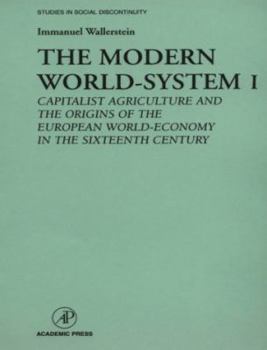The Modern World-System I: Capitalist Agriculture and the Origins of the European World-Economy in the Sixteenth Century
(Book #1 in the The Modern World-System Series)
Select Format
Select Condition 
Book Overview
Immanuel Wallerstein's highly influential, multi-volume opus, The Modern World-System, is one of this century's greatest works of social science. An innovative, panoramic reinterpretation of global... This description may be from another edition of this product.
Format:Paperback
Language:English
ISBN:0127859195
ISBN13:9780127859194
Release Date:January 1974
Publisher:Academic Press
Length:1 Pages
Weight:1.44 lbs.
Dimensions:0.8" x 6.4" x 9.3"
Customer Reviews
2 ratings
Solid!
Published by Thriftbooks.com User , 22 years ago
Despite having read and been impressed by other Wallerstein books, I was almost discouraged by some of the reviews that appeared here, talking about how "dry" this book is and how it is overfull of quotations and such. Ridiculous. I checked it out of a nearby research library and was quickly impressed enough to order a copy for myself at $60! The quotations are fascinating and readers should be impressed by the massive amount of material that Wallerstein has reviewed. Readers seeking an introductory work should look elsewhere. This is the first volume in a series of highly groundbreaking contributions to macrosociology. I personally find it much more illuminating that Wallerstein uses extensive footnoting (where most of the quotations appear) and would much rather read full quotations in these notes than simply see references to hundreds of works that I probably won't have the time and resources to locate anyway. That way, readers can appreciate what they're supposed to from the cited sources rather than just take for granted that they fit in, or have to research them on their own. The book makes valuable points with good regularity and fits them together into what would then be recognized in the field as World Systems Theory. Once I have finished it entirely, I may want to shift my rating. For now, the theoretical significance of this book (whose qualities are verified by my readings so far) definitely makes it essential reading for grad students or professionals in macrosociology. Introductory readers should probably start with introductory chapters (in theory and global inequalities) from a basic Sociology textbook and then read Wallerstein's more concise statement "Historical Capitalism" before proceeding on to this detailed series of books.
The manifesto of world system theory
Published by Thriftbooks.com User , 22 years ago
This book is the manifesto of world system theory. and that it was awarded by American association of sociology. Previously, the capitalism begin with the 1st industrial revolution. but Wallerstein questioned this common sense. he asserted it should be dated back to 16th century when Italian city-state prospered with Mediterrean trade. The book begins with how the feudalism fell and capitalism emerged. Volume 1 covers the shift of hegemoney in European world system from Italian city-states, Spain to Holland. The gist of his theorizing is the worldwide division of labor. By the way, Overall points are easy to grasp. but the devils lies in the details. the book is flooded with bulks of long quotations. This distracts the attention of reader, so that lose the line of argument. Reading goes through between quotation to quotation. it even seems Wallerstein has no point of himself. I read twice to catch the logic of each chapter. but no avail. Dose Wallerstein has no ability to abbridge those quotations to his own word? If you are interested in world system theory, I recommend to read Braudel's 'Civilization and Capitalism' instead. it's easy to follow and more systematic. and that much fun to read. Below I try to compare Braudel with WallersteinPower organizes the space. Organized space is the world where our perspective domiciles. There were always several worlds at the same time. For example, the premodern Chinese recognized other peoples than them. But they were outside their world. So they were barbarians who were much the same with beast. Only the one in the world which had meaning to them could be called human being. But now there is only one world on the globe. If we define it as the globalization, the history of capitalism is the process globalization over centuries since the 16th C. This is the grand image Braudel depicts before us in ¡®Civilization and Capitalism¡¯. If so, capitalism is not merely the system of exchange (or production), but the way to organize the world, in other word, the system of power. With no doubt, capitalism is the system of capitals. But capital is the power to control the flow of resources. Capital, in Marx¡¯s word, is the power to control the resources allocation in society. But the resource entails not only physical material but also human labor. No goods can be presented before us without human labor. Then trade of goods must reflect the relation of spaces where human beings dwell, whether it is done with coercion or contract. Trade could be carried out between the urban and the regional. The world Wallerstein depicts is the magnified image into global scale of such an order. The unit in that order is the nation-state. but in Braudel¡¯s image, The unit of space is not the state but the city. Capitalism is the network (or hierarchy) of cities, Braudel argues. Each has its own pros and cones. But these days Braudle¡¯s image has gained popularity over Wallerstein¡¯s, since Braudel¡¯s ¡®point-to-point¡¯ perspective f






